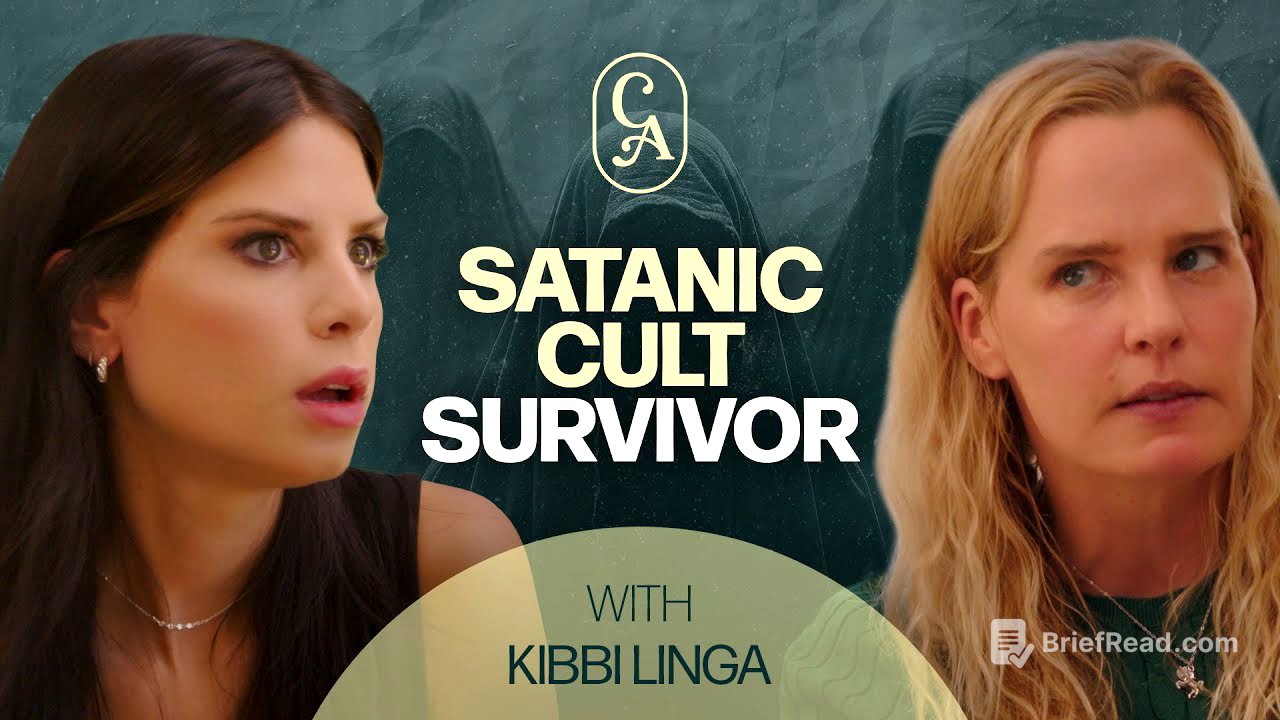TLDR;
Kibby Linga, a survivor of Satanic ritual abuse, shares her harrowing experiences of being born into a cult led by her mother. She recounts the abuse she and her sisters endured, including witnessing and being forced to participate in sacrifices. Kibby discusses her journey of denial, dissociation, and eventual healing, emphasizing the importance of faith, therapy, and self-awareness. She also addresses the challenges of sharing her story and the need for societal change in how abuse survivors and perpetrators are treated.
- Kibby was born into a satanic cult led by her mother.
- She experienced and witnessed horrific acts of abuse, including child sacrifice and cannibalism.
- Kibby developed dissociative identity disorder as a coping mechanism.
- She eventually escaped the cult and began a long journey of healing through therapy, faith, and self-awareness.
- Kibby now shares her story to raise awareness and support other survivors.
Intro [0:00]
Alex Clark introduces Kibby Linga, a survivor of Satanic ritual abuse, emphasizing the sensitive and potentially disturbing nature of the content. The episode will include themes of sexual abuse, animal abuse, murder, cannibalism, incest, and Satanism. Kibby doesn't observe Halloween and asks for extra prayers for animals and children. Alex highlights the importance of supporting the mission to heal a sick culture physically, relationally, and spiritually through donations and reviews.
What is ritual abuse? [2:28]
Kibby identifies herself as a survivor of Satanic ritual abuse, also known as ritual abuse, ramco, or Ault. She describes herself as a strong child with a gift of discernment, who recognized the evil in her family's actions despite growing up in an environment where such behavior was normalized. Kibby stood up for her beliefs, which led to her being treated differently by her mother, who accused her of brainwashing her sisters.
Early childhood abuse [4:38]
Kibby's earliest memories, from ages 0 to 4, are fragmented but include witnessing her father sacrifice a child. She believes her mother had three children to create a cult and fulfill her desires. At age 3 or 4, Kibby was put in a cage in the basement for "brainwashing" her sisters by telling them what their mother was doing was wrong. While in the cage, she asked God for help and felt an outside presence that comforted her. Over time, the cage became a safe place where she felt protected.
The ringleader [7:55]
Kibby identifies her mother as the ringleader of the cult, while her father was a submissive participant. Her father, religiously abused with Jesus, wanted kids and married Kibby's mom because she wanted kids right away. He was a doormat and did anything she told him to do. Kibby believes her father got off to it too.
The cult leader [10:58]
Kibby doesn't know where her mother came from or if she worked under a bigger organization, but from her experience, her mother was the leader of the satanic cult. Kibby's story differs from many others in that she wasn't affiliated with any high-profile people or elites. She has been speaking out about her story since April and has received many messages from people who have also been involved in satanic cults as children. Parents reach out to her because authorities won't listen to their kids.
Day in the life of a satanic cult [12:52]
The day-to-day routine for Kibby's mother as the leader of a satanic cult involved appearing normal on the outside while engaging in evil activities. This included attending Catholic church and getting baptized, using Catholicism as a front. Despite the abuse, Kibby had some fond memories of her mom being loving and kind, especially during her years of denial when her mom would send her Christmas presents with things she liked. Her mom worked at a large bank, not as a teller. Evil people are good at manipulating and showing someone that they look great on the outside.
The first ritual Kibbi witnessed [15:17]
Kibby recalls her mother torturing a baby slowly with what looked like pliers. She doesn't know where the baby came from. She remembers a victim named Sam, an 8-year-old from Chicago, who her parents introduced as her new brother before sacrificing him. Kibby got that name checked out by the authorities, but there was no match. She believes Sam and the other victims came from broken places and that her father was in charge of procuring them.
Zebra [17:43]
Alex promotes Zebra toothpaste, a non-toxic organic toothpaste that uses Xylitol instead of fluoride or hydroxy appetite. She also highlights Zebra's non-toxic floss and deodorant.
Procuring a child for rituals and sacrifice [18:50]
Kibby believes there were connections to the black web or dark web for procuring children. She remembers her parents recording the rituals, suggesting they may have exchanged the videos for money or a child. Her father would be gone for at least a day to get the kids. Authorities don't care unless she hands them hard evidence.
The rituals [19:48]
Kibby remembers four rituals well enough to speak about with confidence, including the beginning, middle, end, and who was involved. Her family lured in at least two other families from the church for these sacrificing rituals. They hosted them in a duplex, at friends' houses from the church, and in a rural area in a barn. The rituals involved masks and costumes, possibly to make the children look crazy if they said anything. Kibby remembers her mom wearing devil horns and another father wearing his daughter's Minnie Mouse costume. During the rituals, her mom would take a broomstick and go like this in between her legs while the torture was happening and after she would get off a parent. Kibby was specifically told to watch the rituals to train her to find pleasure from them.
The 3 Alters [25:37]
Kibby had three alters: Kibby, Paige, and Tuna. Kibby, her child self, wanted to be a painter and tell on her mom. At age 13, she switched her heart or soul with the devil for a new one, going from a green heart to a purple heart and becoming Paige. Paige was carefree and fun, avoiding everything that had happened. At age 24, she went from a purple heart to an orange heart, becoming Tuna. Tuna was from 24 to 30, and then Kibby started embracing extensively this cult stuff.
Kids in satanic cults [28:14]
The other kids in the satanic cult were shameful, so they didn't talk about it much. Kibby has reached out to all of them, but they're all in denial. There was one sacrifice where two cats were sacrificed, and Kibby received some validation from the older sister of the child who made the sacrifice. The rationalization for the sacrifices was that Kibby's mom was the chosen one who could not control it and was doing it to wash away our family sins.
What kind of education do kids in satanic cults receive? [29:56]
Kibby attended Catholic school from ages 0 to 8. When she was 9 or 10, she was pulled out of the Catholic school and put into public school. Her mom quit religion cold turkey and put them into all these extracurricular activities. Kibby struggled a lot in school but is smart. Her mother would put her into a special ed class, making her feel like there was something wrong with her.
Sam is sacrificed [32:13]
During the rituals, Kibby's mom would tie her up on a chair and verbally abuse her. In her most traumatic memory, with Sam, her mother gave her a knife and told her to do it to Sam. Kibby wouldn't and couldn't. Her mom gave it to somebody else who looked very disassociated and did it themselves. Kibby was forced to eat Sam as a consequence for not sacrificing him.
What was your biggest wish? [36:03]
Kibby's biggest wish was to become an artist and tell on her mother. She was 23 years old when she moved from Wisconsin thousands miles away. She physically escaped then, but mentally, spiritually, and emotionally not until age 30.
Intense shame and guilt [37:10]
Between ages 8 and 23, Kibby and her sisters didn't talk about the rituals much due to shame and guilt. When Kibby was about 10 years old, her older sister said, "Remember when our family used to kill people?" Kibby didn't say anything, but her younger sister said, "Yeah." Afterwards, there was a lot of brainwashing and manipulating them into that it never happened.
The healing process [39:46]
As long as Kibby prioritizes her recovery and her faith, it is linear, but it doesn't feel like it. There are times that she is not as close with God. Her friends rotate a lot, which brings a lot of grief, and then she does the footwork to find more supportive friends.









![7 Harsh Truths to Unf*ck Your Life [Live Talk from Melbourne]](https://wm-img.halpindev.com/p-briefread_c-10_b-10/urlb/aHR0cDovL2ltZy55b3V0dWJlLmNvbS92aS9kNC12Q1NTSzkzVS9ocWRlZmF1bHQuanBn.jpg)